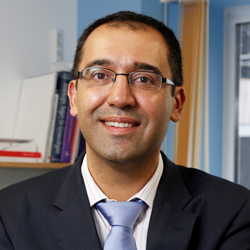
Mr Haitham Hamoda
Medical Advisory Council, British Menopause Society
A leading gynaecologist emphasises the importance of awareness and understanding in supporting women as they go through the menopause.
Dr Haitham Hamoda says that menopause affects women in different ways; some will experience severe symptoms and others may have them for longer than expected, while a quarter of women may not experience symptoms.
Menopause symptoms
Dr Hamoda, a consultant gynaecologist at King’s College Hospital in London where he leads the menopause service, explains that the average age of the menopause — which marks the end of the reproductive life cycle — is 51, although many women experience problematic symptoms during the perimenopause (the phase leading up to the menopause).
Three-quarters of women will experience symptoms for an average of seven years, though a third can have symptoms beyond that. A typical age range for the menopause is 45–55, but it affects 5% of women aged 40–45 and 1% under 40, while a fifth are still having periods at 54.
Common symptoms are hot flushes and night sweats, while some women may also experience changes in sleep and mood; suffer anxiety, irritability and forgetfulness; lose sexual drive; and have vaginal dryness.
Three-quarters of women will experience symptoms for an average of seven years.
Lifestyle changes
Underlining the importance of women understanding what the menopause involves, he says: “For most women, symptoms are the main issue.”
Advice on the menopause is about helping women understand the effects of the menopause and what their choices are in managing the symptoms.”
Dr Hamoda, immediate past chairman of the British Menopause Society, says lifestyle and dietary changes such as cutting down on carbohydrates, sugar, caffeine and alcohol, watching weight and doing exercise can help with menopausal symptoms.
Cognitive behavioural therapy (CBT) is also known to be effective, though he suggests herbal remedies may not be as effective as HRT (hormone replacement therapy), which is “by far the most effective intervention in controlling symptoms.”
Changing attitudes
Dr Hamoda says attitudes in society and industry are changing towards the menopause with raised awareness and workplace policies — but there is still a long way to go.
He would like to see a national baseline of consistent criteria for workplace menopause policies as companies often have different approaches. “Getting the right tone is important, but the key is that the menopause is recognised and women are supported,” he says.
He acknowledges there is a variation in access to care and a need to improve menopause service provision and also stresses the importance of women seeking accurate advice from reputable medical sources and websites.


